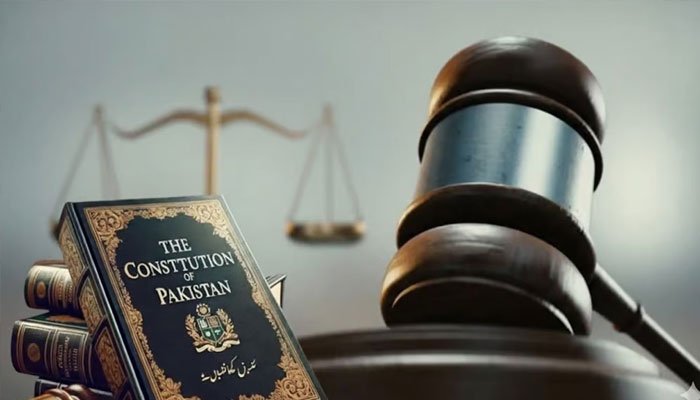A major reform under the proposed amendment is the creation of a new Federal Constitutional Court.
All About Proposed 27th Amendment. The federal government of Pakistan has unveiled the draft of the 27th Constitutional Amendment Bill 2025, which proposes major changes to 48 articles of the Constitution.
As per the details, the amendment aims to restructure parts of the judiciary and defense system, with one of its most talked-about features being the proposal to give lifetime privileges to top military officers promoted to the rank of Field Marshal, Marshal of the Air Force, or Admiral of the Fleet.
In 2024, President Zardari had signed 26th Constitutional Amendment into Law.
Federal Constitutional Court Proposed
A major reform under the proposed amendment is the creation of a new Federal Constitutional Court. The court would be established through an amendment to Article 175, with its headquarters in Islamabad. It would handle cases related to disputes between the federation and provinces, constitutional interpretations, and matters concerning fundamental rights.
The Chief Justice of the new Constitutional Court would serve a three-year term, and judges would retire at the age of 68. The amendment also introduces a new judicial appointment process, creating a Judicial Commission that includes the Chief Justices of both the Supreme Court and the new Constitutional Court.
Under the proposal, the powers of the Supreme Court of Pakistan would be limited, as certain constitutional matters would be transferred to the new Constitutional Court. Both courts would function independently, with their decisions not binding on each other. However, rulings from the Constitutional Court would be binding on all subordinate courts.
The amendment also calls for the reconstitution of the Supreme Judicial Council, where both Chief Justices will serve as members. A new chapter outlining the structure and powers of the Constitutional Court would be added to the Constitution.
Key Changes to Articles
The amendment suggests abolishing Article 184, which currently grants the Supreme Court suo motu powers. It also allows the Prime Minister to appoint up to seven advisors and increases the number of advisors allowed for provincial Chief Ministers.
In Article 206, if a judge refuses appointment to the Supreme Court or Constitutional Court, it would be considered a retirement. The Supreme Judicial Council would also be required to make new rules within 60 days.
Reforms in Senate Elections
The bill addresses delays in Senate elections by ensuring that future elections are held simultaneously, making the process more transparent. The tenure of newly elected members would also account for any delay.
Debate Over Article 243 & Military Structure
One of the most sensitive and widely discussed parts of the amendment relates to Article 243, which deals with the command and control of the armed forces. Under the proposal, the President, on the advice of the Prime Minister, would appoint the heads of the Army, Navy, and Air Force.
The post of the Chairman of the Joint Chiefs of Staff Committee would be abolished by November 27, 2025, with its responsibilities shifted to the Chief of the Army Staff. The amendment also introduces the position of Commander of the National Strategic Command, to be chosen from the Pakistan Army.
A major new provision states that any officer promoted to the rank of Field Marshal, Marshal of the Air Force, or Admiral of the Fleet would hold that rank for life, keeping their uniform and privileges permanently. They could only be removed under the same procedure used for removing the President, ensuring strong job protection.
Their salaries and benefits would be set by the President on the advice of the Prime Minister, and they would continue to serve in roles assigned by the federal government. Legal protections similar to those granted to the President would also apply to them.
Political Reactions on 27th Constitutional Amendment
Defence Minister Khawaja Asif said the government was still holding consultations with other political parties and hoped for consensus within a few days. He clarified that there were no plans to roll back the 18th Amendment and said the reforms aim to strengthen governance and defense coordination.
The Pakistan Peoples Party (PPP) has conditionally supported parts of the amendment, especially the proposals related to Article 243, the creation of the Constitutional Court, and the transfer of judges. Party chairman Bilawal Bhutto Zardari said these changes could help strengthen parliamentary oversight if implemented properly.
However, other opposition leaders, including PTI’s Barrister Gohar Ali Khan and JUI-F chief Maulana Fazlur Rehman, have warned the government against reducing provincial powers or rushing the process without full consultation. They argued that any move to weaken the 18th Amendment or provincial autonomy would face strong resistance.
Journalists Protest in Parliament House
Amid the ongoing debate, journalists covering the National Assembly staged a walkout to protest recent job cuts in media organisations and restrictions on press freedom. Information Minister Attaullah Tarar met with reporters and assured them that the issue would be taken up with media owners.





